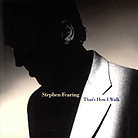April 2003
Well known in Canada and a four-time nominee for that country’s Grammy counterpart, the Juno Award, Fearing recorded five solo albums before this one. And the arrangements and production here suggest a veteran -- Fearing produced it along with guitarist Colin Linden, who also provides compelling licks on some of the tunes. Rich in sound, the CD avoids the clutter that can befall recordings with more instruments than necessary for simple songs. The first song, "Like the Way You Said," is somewhat bluesy, with a good beat. The second, "The Finest Kind," rocks even better, introducing high organ chords, played by Richard Bell, which give it a soaring quality. These two tracks also tell us we’ll hear some hot drumming: Gary Craig has a strong feel for these tunes, driving them forward and creating rhythmic variety without distracting from the singing or the other instruments. The clever and lilting "Town Called Jesus" observes, "Our founding fathers built this town / And they named it for God’s Son / On Sundays, it was fine clothes for everyone / But on Mondays when the gloves came off / There was always hell to pay / On the other side of Jesus, half a world away." On this track, a trumpet and alto sax that spice things up in an inspired way. I notice a Warren Zevon songwriting influence in "On the Great Divide" (reminiscent of "Model Citizen") and the title song (a bit like "Quite Ugly One Morning"). Fearing is capable of sounding a great deal like Zevon in his singing, too, but that is not an effect he sustains. My favorite -- I can’t help it; it’s my traditional-ballad background -- is the one Fearing didn’t write. With the least backup, it gives the least impression of trying really hard while allowing Fearing’s good guitar playing to be heard the most prominently and his voice to be at its calmest. Also, it’s just such a darned good and pretty song -- it is hard to compete with generations of "fine tuning"! It is amusing that the publicist and liner artists go out of their way to portray Fearing as having (from the press release) "a raw, streetwise edge." Gee, if the record company hadn’t told me that, I would have guessed this musician had grown up in a middle-class neighborhood like mine, listened to records like mine, and like me, survived on Dad’s paycheck, not "streetwisdom." Even if it turns out he was a regular urchin, the many uses of electric guitar where acoustic would do and studio electronics throughout just don’t evoke police nightsticks or broken sidewalks sprinkled with blackened chewing-gum spots. This business of singers boasting a rough edge has become tiresome. That’s How I Walk is a good CD, however, even if Fearing walks in nice places. GO BACK TO: |
 Stephen Fearing - That's
How I Walk
Stephen Fearing - That's
How I Walk Stephen Fearing likes to sing.
That comes through nicely on That’s How I Walk. Fearing sings in a way that
communicates, bringing the most from each song to the listener. Having written or
co-written all but one of the album’s 14 songs, he clearly values the songs
and wants the listener to get something out of them. And he makes no less of an effort on
track 14, "The Parting Glass," the traditional ballad on which Bob Dylan’s
"Restless Farewell" is based.
Stephen Fearing likes to sing.
That comes through nicely on That’s How I Walk. Fearing sings in a way that
communicates, bringing the most from each song to the listener. Having written or
co-written all but one of the album’s 14 songs, he clearly values the songs
and wants the listener to get something out of them. And he makes no less of an effort on
track 14, "The Parting Glass," the traditional ballad on which Bob Dylan’s
"Restless Farewell" is based.